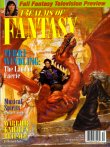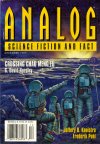 |
MAGAZINES
|
 |
 |
Profiles of December 1997 Issues
 |
Interzone December 1997
An interview with Judith Merrill, from two weeks before her death last September. She describes the genesis of the two novels she wrote with Cyril Kornbluth, the impression the controversial British magazine New Worlds made on her, and recalls the hostile reaction of sf writers in a preview audience to the film 2001. • Nick Lowe's Mutant Popcorn column provides the best-yet analysis of the film Contact and how it betrays the principles that Carl Sagan espoused. •
An article by Brian Stableford renders Hugo Gernsback's genesis of science fiction more accidental than paternal. Gernsback, who let his early 'scientifiction' magazines disperse in bankruptcy suits, was more interested in publishing radio and sex magazines, and only became ''the Father of Science Fiction'' in the hero-worshipping reconception of Sam Moskowitz in the 1950s. Gernsback remained bitter that he was unrecognized as a technological prophet, and considered modern science fiction of the early 1960s (in Stableford's words) mostly rubbish, ruined by literary affectation. •
John Clute returns to the book review pages after a long absence writing encyclopedia; he commemorates Judith Merril and George Hay. •
Fiction by Stephen Baxter, David Langford, and others.
(Fri 9 Jan)
|
 |
The New York Review of Science Fiction, December 1997
Half the issue is taken up by an engrossing memoir from John Mayer about the late Karl Edward Wagner, the fantasy writer who dressed like a biker and whose most famous character, Kane, was a sword and sorcery hero who defied the standard cliches. Reviews include Bill Sheehan on DeLillo's Underworld -- a justifiable inclusion in an SF journal because the book ends in cyberspace: ''a lyrical evocation of an actual, living world wide web, a place outside of space and time, in which all things really are connected, with all argument, all conflict programmed out.'' And a reprint of a letter by George Turner in the July 1932 Amazing Stories -- his first time in print.
(Wed 24 Dec)
|
 |
Odyssey Issue 1, November/December 1997
The magazine's second issue features a new cover layout and interior layout (already). David Langford affectionately describes James White's ''Sector General'' series as an example of work by a vanishing midlist writer who should be kept in print. Terry Bisson is interviewed. Risky media hook: an article about ''Babylon 5''. Fiction by Mary Soon Lee, Jeff Hecht, Vonda N. McIntyre (an excerpt from her current novel), and Stephen Baxter -- a brilliant short story called ''Glass Earth Inc.'' (Posted Mon 1 Dec 97)
|
 |
F & SF, December 1997
Pat Murphy and Paul Doherty's first science column, ''Watch the Skies!'', is about rainbows, green flashes, and other sky phenomena, with instructions; Isaac Asimov meets Mr. Wizard. Intriguing bit: moonlight produces rainbows too, and photographs of them reveal colors too dim for human eyes to perceive. Fiction includes Paul Park's neat ''Get a Grip'', reprinted from Omni Online. Gordon Van Gelder editorializes about the putative ''death of science fiction'', a discussion usually focused on money and book royalties. ''There's more good SF getting published nowadays than most people have time to read.'' (Posted Fri 28 Nov 97)
|
 |
Realms of Fantasy, December 1997
Jane Yolen's guest editorial describes various fantasy voices by way of example: the same scene written three ways. Terri Windling's Folkroots column examines ''good neighbors'' -- faeries from many lands and cultures. The Gallery displays art of the Spanish illustrator Sanjulian. And fiction by Susan J. Kroupa, A. M. Dellamonica, and others. (Posted Mon 1 Dec 97)
|
 |
Analog, December 1997
Excellent hard-SF by G. David Nordley: explorers on the south pole of Mercury. Frederik Pohl's serial "O, Pioneer!" concludes. Stanley Schmidt editorializes on the human tendency to dichotomize: even scientists prefer single explanations (for example, to Pleistocene mass extinctions) over suites of reinforcing causes. Mark S. Lesney's fact article explores life in extreme climatic conditions on planet Earth--volcanoes, deep sea rifts, polar ice sheets. John G. Cramer describes efforts of some physicists, frustrated with the elusive simplicity of the "standard model" of quantum chromo-dynamics, to break it. And a Christmas story set in an alluring if implausibly idealistic Republic of Currier and Ives, by Jeffery D. Kooistra.
(11 Oct 1997)
|
 |
Asimov's, December 1997
Fiction includes Christmas stories by Connie Willis and Janet Kagan, provocative far-future pieces by Michael Swanwick and Mike Resnick, and a Howard Waldrop novelette about masked Mexican wrestlers that is indescribable and unique. Robert Silverberg reflects on the latest craziness from Berkeley, California--"world capital of anti-science Luddite know-nothing-ism"--worries that a tritium labeling facility might be contaminating local goat cheese. Paul Di Filippo's eclectic review column ranges from small-press horror volumes to the cultural and literary allusions of Gene Wolfe's Exodus of the Long Sun.
(20 Oct 1997)
|
|
 |



